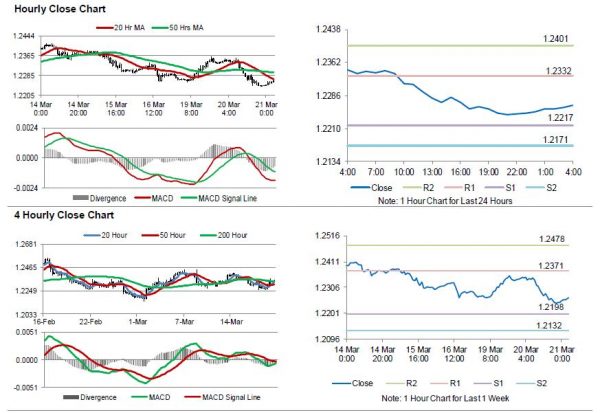For the 24 hours to 23:00 GMT, the EUR declined 0.81% against the USD and closed at 1.2245, pressured by weaker-than-expected ZEW economic sentiment data across the Euro-zone.
The Euro-zone’s ZEW economic sentiment index significantly declined to a level of 13.4 in March, as concerns over the US-led global trade conflict dented investor sentiment. The index had registered a reading of 29.3 in the prior month, while investors had envisaged for a drop to a level of 28.1. Moreover, the region’s flash consumer confidence index unexpectedly remained steady at a level of 0.1 in March, while investors had expected the index to record a flat reading.
Separately, confidence among investors in Germany plunged to its lowest level in 18 months in March, after the ZEW economic sentiment index dipped more-than-anticipated to a level of 5.1, as strength in the Euro clouded the outlook for the export-driven economy. In the prior month, the index had registered a reading of 17.8, while markets were expecting it to ease to a level of 13.0. Moreover, the nation’s ZEW current situation index dropped to a level of 90.7 in March, less than market consensus for a fall to a level of 90.0. In the previous month, the index had recorded a reading of 92.3.
In the Asian session, at GMT0400, the pair is trading at 1.2263, with the EUR trading 0.15% higher against the USD from yesterday’s close.
The pair is expected to find support at 1.2217, and a fall through could take it to the next support level of 1.2171. The pair is expected to find its first resistance at 1.2332, and a rise through could take it to the next resistance level of 1.2401.
In absence of key macroeconomic releases in the Euro-zone today, investors would direct their attention to the US Federal Reserve policy decision, due later today, where the central bank is widely expected to raise interest rates. Moreover, the US existing home sales data for February, will also be eyed by traders.
The currency pair is showing convergence with its 20 Hr moving average and trading below its 50 Hr moving average.

